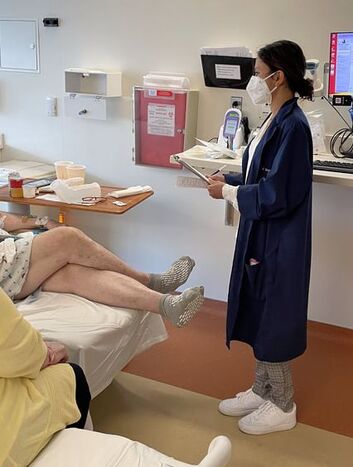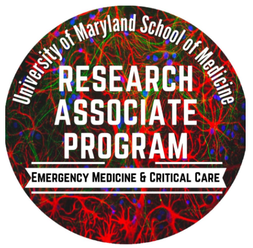
Patients and Families’ Satisfaction in The Critical Care Resuscitation Unit
The Critical Care Resuscitation Unit (CCRU) at the University of Maryland Medical Center (UMMC) was established in July 2013 to expedite care of critically ill patients from other hospitals. UMMC is an academic quaternary hospital with 801 beds, including 155 adult intensive care (ICU) beds. The mission of the CCRU is to expedite transfer, provide resuscitation, and perform diagnostic and therapeutic interventions prior to definite management. Patients are then transferred to an appropriate inpatient unit when clinically stable. Previous studies showed that CCRU-bound patients were transferred faster and had improved outcomes compared to those transferred to other ICUs. Utilizing UMMC’s records for patient’s admitted from 2014-2018, we have previously shown that the 6-bed CCRU contributed up to 17% of total interhospital transfer at UMMC.
The purpose of this CCRU satisfaction study is to assess patient’s satisfaction of pre-CCRU care, care during transport, and care in the CCRU itself. Patients must have been transferred from an outside hospital and be >18 years old in order to be enrolled. Our members screen patients for eligibility and thereafter ask them and/or their family members to complete a survey questionnaire for successful enrollment. The survey asks patients to rate satisfaction with their care on a qualitative scale in the following areas: care at previous hospital, care during transport, and care in the CCRU. Enrollees with a chief diagnosis of intracranial intracerebral hemorrhage (ICH) stroke requiring thrombectomy are designated as “high-risk” study participants. We follow up with high-risk patients via telephone call 90 days after their discharge from UMMC to assess how well they return to usual activities since sustaining their injuries and receiving treatment. We use two assessment tools to classify global outcomes in our high-risk enrollees: the simplified modified Rankin Scale questionnaire (smRSq) and the Extended Glasgow Outcome Scale (GOSE).
Through this study, we hope to identify clinical factors that may affect patient’s satisfaction with their care. We plan to collect 1500 surveys: 500 from both parents and families, 500 from patients only, and 500 from family only. We may contact up to 750 high-risk patients between 90-180 days after leaving the hospital to understand how well they return to usual activities.
The Critical Care Resuscitation Unit (CCRU) at the University of Maryland Medical Center (UMMC) was established in July 2013 to expedite care of critically ill patients from other hospitals. UMMC is an academic quaternary hospital with 801 beds, including 155 adult intensive care (ICU) beds. The mission of the CCRU is to expedite transfer, provide resuscitation, and perform diagnostic and therapeutic interventions prior to definite management. Patients are then transferred to an appropriate inpatient unit when clinically stable. Previous studies showed that CCRU-bound patients were transferred faster and had improved outcomes compared to those transferred to other ICUs. Utilizing UMMC’s records for patient’s admitted from 2014-2018, we have previously shown that the 6-bed CCRU contributed up to 17% of total interhospital transfer at UMMC.
The purpose of this CCRU satisfaction study is to assess patient’s satisfaction of pre-CCRU care, care during transport, and care in the CCRU itself. Patients must have been transferred from an outside hospital and be >18 years old in order to be enrolled. Our members screen patients for eligibility and thereafter ask them and/or their family members to complete a survey questionnaire for successful enrollment. The survey asks patients to rate satisfaction with their care on a qualitative scale in the following areas: care at previous hospital, care during transport, and care in the CCRU. Enrollees with a chief diagnosis of intracranial intracerebral hemorrhage (ICH) stroke requiring thrombectomy are designated as “high-risk” study participants. We follow up with high-risk patients via telephone call 90 days after their discharge from UMMC to assess how well they return to usual activities since sustaining their injuries and receiving treatment. We use two assessment tools to classify global outcomes in our high-risk enrollees: the simplified modified Rankin Scale questionnaire (smRSq) and the Extended Glasgow Outcome Scale (GOSE).
Through this study, we hope to identify clinical factors that may affect patient’s satisfaction with their care. We plan to collect 1500 surveys: 500 from both parents and families, 500 from patients only, and 500 from family only. We may contact up to 750 high-risk patients between 90-180 days after leaving the hospital to understand how well they return to usual activities.
